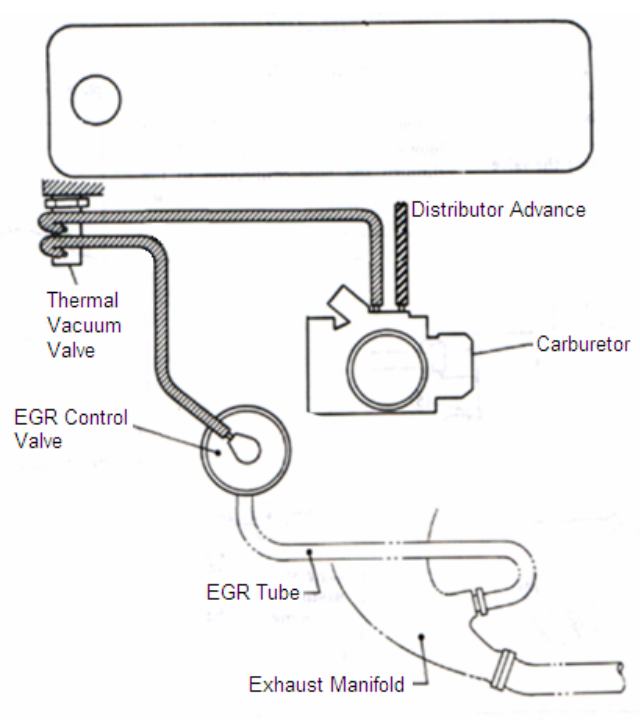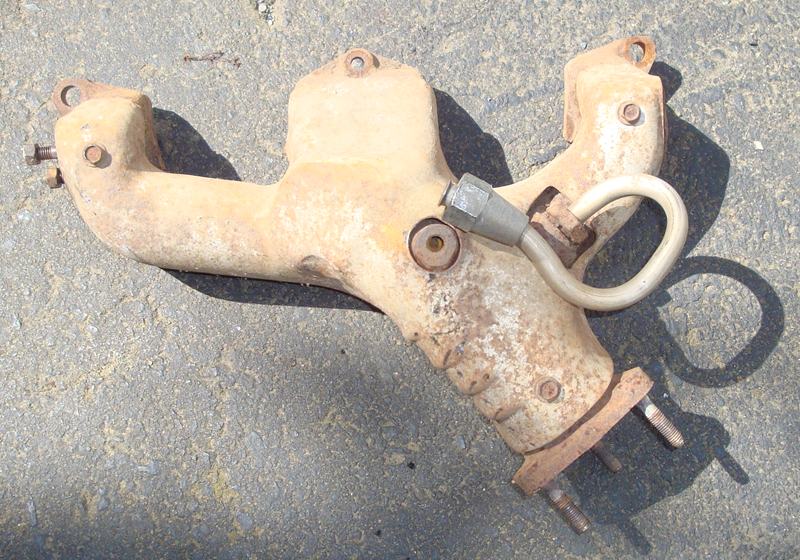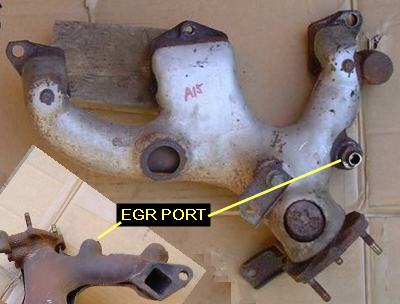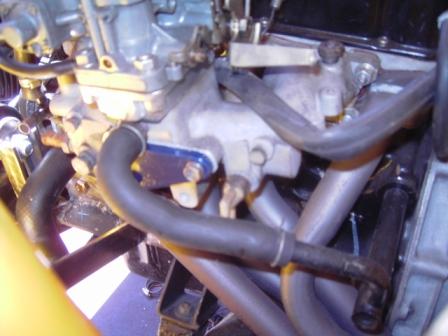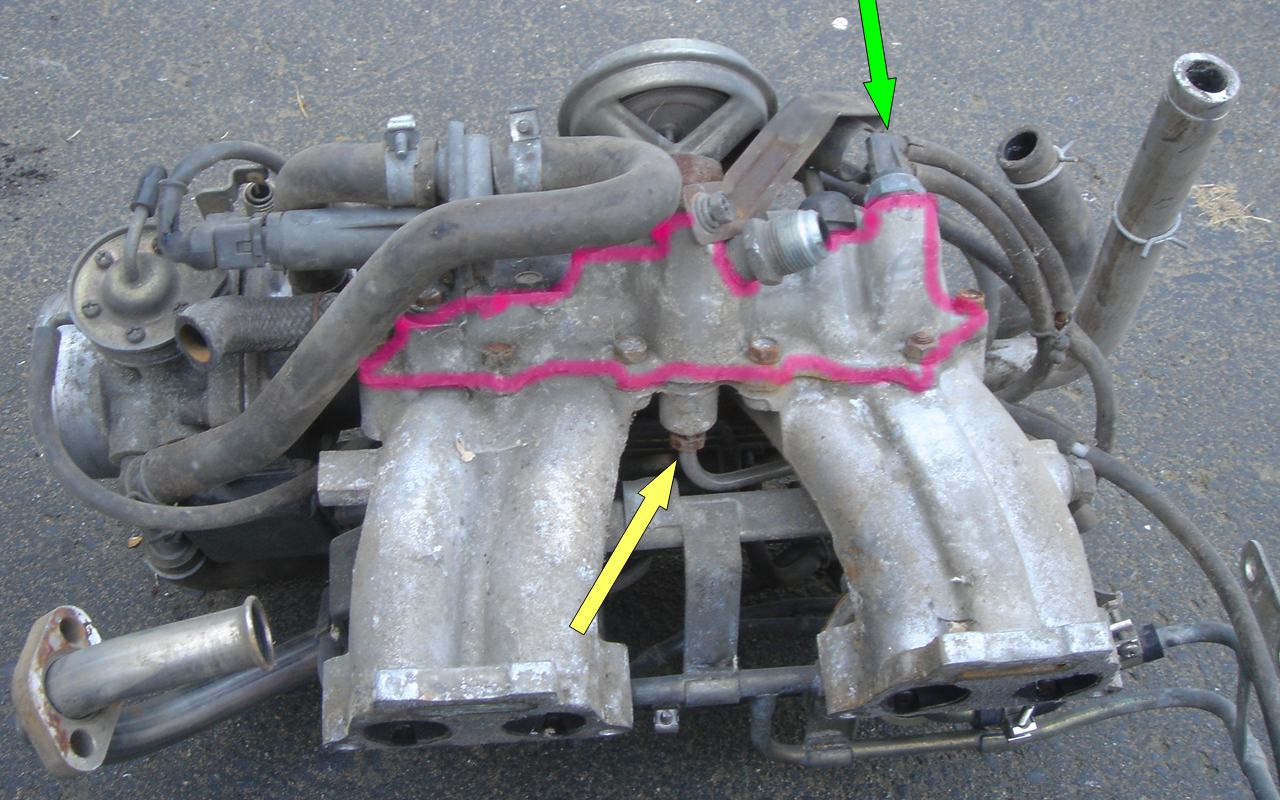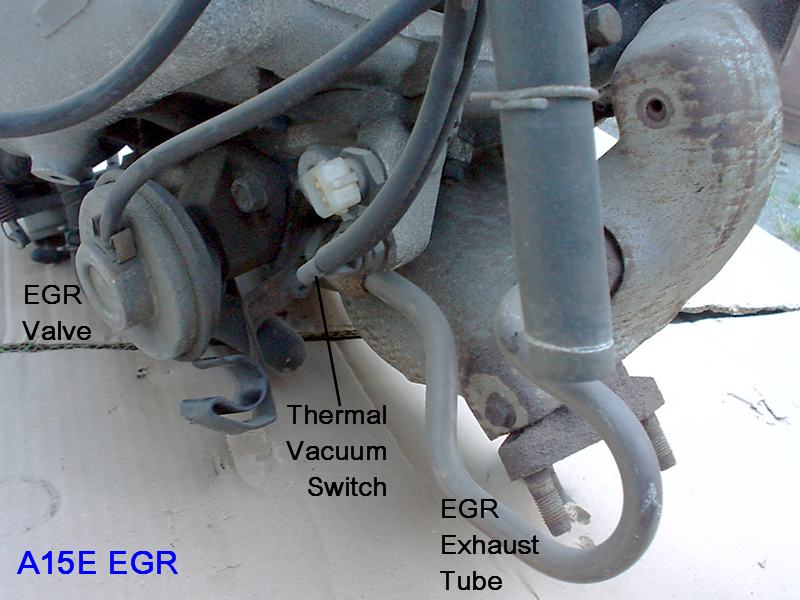| Revision as of 09:11, 9 November 2011 ddgonzal (Talk | contribs) (->3-port Thermal Switch) <- Previous diff |
Current revision ddgonzal (Talk | contribs) (->Intake Manifold) |
||
| Line 1: | Line 1: | ||
| - | Exhaust Gas Recirculation ([[EGR]]) was first used starting with 1974 B-210 (North American [[B210]]) models. Australia 1200 utes got EGR in 1982. Japan 1200 trucks got it in 1989. It recirculates a small portion of the exhaust back into the combustion chamber. Although this dilutes the the air/fuel mixture (reducing performance), it reduces burning temperatures resulting in drastic reductions of Oxides of Nitrogen (NOx). | + | Exhaust Gas Recirculation ([[EGR]]) was first used starting with 1974 North American [[B210]] models then in Japan B210 and 1200 trucks in 1975. Australia 1200 utes got EGR in 1982. It recirculates a small portion of the exhaust back into the combustion chamber. Although this dilutes the the air/fuel mixture (reducing performance), it reduces burning temperatures resulting in drastic reductions of Oxides of Nitrogen (NOx). NOx makes smog and lung and eye irratants, so reducing it makes for clean air. EGR is de-activated at full throttle, so it won't hurt peak HP. It is also known as [[NAPS]] (Nissan Anti-Pollution System). |
| = Overview = | = Overview = | ||
| - | EGR is a key emission control technology. Even the new 2012 models use EGR, although now it can be effected by variable camshaft overlap and engine computer control. Datsuns use an early version of EGR which is heavy-handed regarding performance, but really does clean up the air. | + | EGR is a key emission control technology. Even the new 2012 cars use EGR, although now it can be created by variable camshaft overlap and engine computer control. Datsuns use an early version of EGR which is heavy-handed regarding performance, but really does clean up the air. |
| The EGR valve simply mixes a little exhaust into the intake manifold. | The EGR valve simply mixes a little exhaust into the intake manifold. | ||
| - | <br>[http://datsun1200.com/modules/myalbum/photo.php?lid=23878 http://datsun1200.com/uploads/photos/23878.jpg] | + | <br>{{Album|23878}} |
| <br>Varying amounts of exhaust gas are let in by the pintle valve, which travel to the inlet manifold via the large square opening. | <br>Varying amounts of exhaust gas are let in by the pintle valve, which travel to the inlet manifold via the large square opening. | ||
| Line 25: | Line 25: | ||
| EGR parts in red: | EGR parts in red: | ||
| - | <br>[http://datsun1200.com/modules/myalbum/photo.php?lid=23872 http://ddgonzal.members.winisp.net/getThumb.aspx?width=400&uri=http://datsun1200.com/uploads/photos/23872.jpg] | + | <br>{{Album|23872}} |
| Most basic EGR system | Most basic EGR system | ||
| - | <br>[http://datsun1200.com/modules/myalbum/photo.php?lid=23879 http://ddgonzal.members.winisp.net/getThumb.aspx?width=400&uri=http://datsun1200.com/uploads/photos/23879.jpg] | + | <br>{{Album|23879}} |
| Generally speaking, the more complex the EGR system, the better. The complexity was to use less recirculation which is good for performance and fuel economy. This simplest implementations affected performance worse. There is little downside to this complexity because generally if anything fails, EGR fails to work and so doesn't hurt performance. | Generally speaking, the more complex the EGR system, the better. The complexity was to use less recirculation which is good for performance and fuel economy. This simplest implementations affected performance worse. There is little downside to this complexity because generally if anything fails, EGR fails to work and so doesn't hurt performance. | ||
| Line 42: | Line 42: | ||
| First EGR (1974) -- tube goes behind manifold | First EGR (1974) -- tube goes behind manifold | ||
| - | <br>[http://datsun1200.com/modules/myalbum/photo.php?lid=22072 http://datsun1200.com/uploads/photos/22072.jpg] | + | <br>{{Album|22072}} |
| Late A14 style | Late A14 style | ||
| - | <br>[http://datsun1200.com/modules/myalbum/photo.php?lid=21832 http://ddgonzal.members.winisp.net/getThumb.aspx?width=400&uri=http://datsun1200.com/uploads/photos/21832.jpg] | + | <br>{{Album|21832}} |
| Early A14 FU style | Early A14 FU style | ||
| - | <br>[http://datsun1200.com/modules/myalbum/photo.php?lid=19797 http://datsun1200.com/uploads/photos/19797.jpg] | + | <br>{{Album|19797}} |
| Vanette Style | Vanette Style | ||
| - | <br>[http://datsun1200.com/modules/myalbum/photo.php?lid=23876 http://datsun1200.com/uploads/photos/23876.jpg] | + | <br>{{Album|23876}} |
| Variations consist of: | Variations consist of: | ||
| Line 61: | Line 61: | ||
| = Intake Manifold = | = Intake Manifold = | ||
| [[Intake Manifold]] has a specially machined flat area where the '''EGR Body''' bolts. Nissan calls this adapter body the "EGR passage". In turn, the '''EGR Control Valve''' bolts to the body. | [[Intake Manifold]] has a specially machined flat area where the '''EGR Body''' bolts. Nissan calls this adapter body the "EGR passage". In turn, the '''EGR Control Valve''' bolts to the body. | ||
| + | |||
| + | circa 1980 A14 JDM with VVT (or BPT) | ||
| + | <br>{{Album|23900}} | ||
| 1981-1982 [[Heads#H95_Small-Oval_Shrouded-port_Head|H95]] EGR (valve not installed) | 1981-1982 [[Heads#H95_Small-Oval_Shrouded-port_Head|H95]] EGR (valve not installed) | ||
| - | <br>[http://datsun1200.com/modules/myalbum/photo.php?lid=23877 http://ddgonzal.members.winisp.net/getThumb.aspx?width=400&uri=http://datsun1200.com/uploads/photos/23877.jpg] | + | <br>{{Album|23877}} |
| + | |||
| + | == Block Off == | ||
| + | For off-road vehicles, or when using a newer manifold on a non-EGR engine, the EGR valve can be unbolted and a block-off plate put over the opening. | ||
| + | |||
| + | {{Album|11217}} | ||
| = EGI = | = EGI = | ||
| A14E and A15E [[EGI]] fuel injection engine manifolds use an EGR system. | A14E and A15E [[EGI]] fuel injection engine manifolds use an EGR system. | ||
| - | [http://datsun1200.com/modules/myalbum/photo.php?lid=23874 http://ddgonzal.members.winisp.net/getThumb.aspx?width=400&uri=http://datsun1200.com/uploads/photos/23874.jpg] | + | {{Album|23874}} |
| - | [http://datsun1200.com/modules/myalbum/photo.php?lid=23875 http://ddgonzal.members.winisp.net/getThumb.aspx?width=400&uri=http://datsun1200.com/uploads/photos/23875.jpg] | + | {{Album|23875}} |
| - | [http://datsun1200.com/modules/myalbum/photo.php?lid=23873 http://ddgonzal.members.winisp.net/getThumb.aspx?width=400&uri=http://datsun1200.com/uploads/photos/23873.jpg] | + | {{Album|23873}} |
| Line 81: | Line 89: | ||
| This prevents EGR from working until the engine warms up. This switch is your friend. | This prevents EGR from working until the engine warms up. This switch is your friend. | ||
| - | === Thermal Vacuum Switch === | + | {{Photo|PVS90.jpg|Datsun%201200/Parts}} |
| + | |||
| + | === 2-Port Thermal Vacuum Valve === | ||
| From 1975, a simple, reliable engine-coolant Vacuum switching valve is used by most implementations. It threads into the cylinder head and is warmed by the engine coolant. Nissan started calling this a TVV (Thermal Vacuum Valve) in the 1980s. | From 1975, a simple, reliable engine-coolant Vacuum switching valve is used by most implementations. It threads into the cylinder head and is warmed by the engine coolant. Nissan started calling this a TVV (Thermal Vacuum Valve) in the 1980s. | ||
| Line 87: | Line 97: | ||
| The switch only opens when the coolant exceeds 134F (57C). | The switch only opens when the coolant exceeds 134F (57C). | ||
| + | |||
| + | 14890-U6700 THERMAL VACUUM VALVE | ||
| + | * B210 JPN A12.V,A14.V 1975-1977 | ||
| + | * USA/CAN B210 1975-1977 | ||
| + | * B120 A12S 7908-8910 | ||
| + | * B310 JPN VAN | ||
| + | * B310 A14/A15+A14.KFU / A12.CAN 1278- | ||
| + | * C22 A15S 8605- | ||
| + | {{Photo|14890-U6700.jpg|Datsun%201200/Parts}} | ||
| + | * NPT 3/8" - 18 threads | ||
| + | |||
| + | 14890-U7800 | ||
| + | * C120 A14.K, A15 | ||
| + | * B310 JPN A12S.S,K A14.V A13s, A15S, A15E | ||
| + | {{Photo|14890-U7800.jpg|Datsun%201200/Parts}} | ||
| + | |||
| + | * 1982 Datsun 210 | ||
| + | {{Photo|PVS90.jpg|Datsun%201200/Parts}} | ||
| + | |||
| + | 14890-H9910 <> 14890-H9911 > 14890-H7260 | ||
| + | * USA B210 A14 1977 14890-H7260 | ||
| + | * USA B310 A12.CAL 0879-0780 | ||
| + | {{Photo|PVS58.jpg|Datsun%201200/Parts}} | ||
| + | |||
| + | 1978 B210 with 2-port TVV | ||
| + | <br>{{Photo|20090816163941DSC08629.jpg|Datsun%20Misc/B210}} | ||
| === Thermal Electric Switch === | === Thermal Electric Switch === | ||
| - | For the first year 1974, instead of the simple thermal vacuum switch, an engine-coolant electric switch was used along with a relay and an electrically-operated vacuum switch. This was replaced in 1975 by the simpler thermo-vacuum switch. | + | For the first year 1974, instead of the simple thermal vacuum switch, an engine-coolant electric switch was used along with a relay and an electrically-operated vacuum switch. This was replaced in 1975 by the simpler thermo-vacuum switch. This electric switch came on at an early temperature of 88-106F (31-41C). |
| + | USA B210 A13 1974 | ||
| + | 22120-H6200 ASSY-SWITCH WATER TEMP | ||
| + | 22110-N3600 ASSY-SWITCH WATER TEMP | ||
| + | * (22110-N3600 shown in catalog, perhaps a typo) | ||
| + | * 22120-N3601 used by 620 L18 1974 & S30 L26 1974 | ||
| - | The switch came on at an early temperature of 88-106F (31-41C). | + | USA B310 |
| + | 22120-H9801 0880- A14/A15 | ||
| + | 22120-H9501 0880- A14/A15 | ||
| + | {{Photo|temp_switch.jpg|sightings/forum}} | ||
| + | 22120-H8900 0879- A12 CAL | ||
| + | |||
| + | temp switch | ||
| + | http://img33.imageshack.us/img33/629/1200sensor.jpg | ||
| - | === 3-port Thermal Switch === | + | 35C switch |
| + | {{Upload!|9764_512957668eb5b.jpg}} | ||
| + | |||
| + | For 1980 and 1981, some models used an electric switch: | ||
| + | ENGINE COOLANT TEMPERATURE SWITCH | ||
| + | {{Photo!|22120-H9560.jpg|Datsun%201200/Parts}} | ||
| + | USA A15 N10 1981, fitted to EGR boss or to head | ||
| + | * 22120-H9501 35C | ||
| + | * 22120-H9560 35C | ||
| + | * 22120-H9801 17C | ||
| + | 22120-H8900 CAL | ||
| + | * USA A14 N10 1980 | ||
| + | * JAPAN B310 A14E [[EGI]] | ||
| + | * EUROPE C120 A15S [fitted to cylinder head, front left] | ||
| + | |||
| + | === 3-port Thermal Vacuum Valve === | ||
| This switch looks similar to the 2-port TVV, but the third port goes to the air cleaner. It bleeds off the carburetor vacuum signal, thus de-activating EGR. It is used in conjuction with a vacuum-delay valve in the hose that goes to EGR valve, which smooths out the reponse on quick throttle changes. | This switch looks similar to the 2-port TVV, but the third port goes to the air cleaner. It bleeds off the carburetor vacuum signal, thus de-activating EGR. It is used in conjuction with a vacuum-delay valve in the hose that goes to EGR valve, which smooths out the reponse on quick throttle changes. | ||
| - | This 3-port switch allowed Nissan to combine the EGR switch with the [[TCS]] switch, since both systems bleed to air. | + | This switch is located on the rear of the cylinder head (firewall end), whereas the 2-port valve in on the front end. |
| + | |||
| + | This 3-port switch allowed Nissan to combine the EGR switch with the Spark Control (vacuum advance) switch, since both systems bleed to air. | ||
| * One port for EGR signal | * One port for EGR signal | ||
| * One port for Vacuum Advance (spark) signal | * One port for Vacuum Advance (spark) signal | ||
| * One port for air bleed | * One port for air bleed | ||
| - | TCS (Transmission Controlled Spark) was used on some Manual Transmission models, and cuts the spark advance when in certain gears. By using a 3-port switch, it can bleed off both spark advance and EGR signals. | ||
| - | === Transmission Switch === | + | By using a 3-port switch, it can bleed off both spark advance and EGR signals: |
| - | Some models de-activated EGR when in nuetral or in top gear. This made use of the transmission Nuetral switch and transmission Top switch. | + | * When when the engine is cold, bleeds the EGR port, thus deactivating EGR |
| + | * When engine is in-between hot and cold, bleeds the distributor port | ||
| + | |||
| + | IMPORTANT | ||
| + | The three ports act differently | ||
| + | So connect the hoses correctly | ||
| + | * Top port: to air cleaner | ||
| + | * Middle port: To BPT | ||
| + | * Lowest port (closest to head): to distributor | ||
| + | |||
| + | 14890-U9800/14890-U9810 | ||
| + | * USA B310 0880- A14/A15 A12.FED A12.CAL | ||
| + | * One hose is larger than the other two | ||
| + | {{Photo|14890-H9810.jpg|Datsun%201200/Parts}} | ||
| + | |||
| + | 14890-H7700 | ||
| + | * USA B210 (EXC FED GFU) 1978 | ||
| + | * B310 USA A14/A15 USA -0780 / A12.FED 0879-0780 | ||
| + | * 3 equal size hoses | ||
| + | {{Photo|14890-H7700.jpg|Datsun%201200/Parts}} | ||
| + | |||
| + | == Vacuum Switching Valve == | ||
| + | Some MT (manual transmission) models de-activated EGR when in neutral or in top gear. This made use of the transmission Neutral switch and transmission Top switch to electrically operate a bleed switch. | ||
| + | |||
| + | 1975 Manual Transmission FED & CAN | ||
| + | 1978 Manual Transmission USA except FU Engine models | ||
| + | |||
| + | This is similar to the Transmission Controlled Spark ([[TCVAS]]) used on some Manual Transmission models, which cuts the spark advance when in certain gears. Only in this case it deactivates EGR. | ||
| + | |||
| + | VALVE ASSY-SOLENOID EGR CUT | ||
| + | 14956-U6700 JPN B210 A14T <> 14956-U6701 | ||
| + | 14956-U6705 JPN B210 A14S.V < 14956-U6701 | ||
| + | 14956-H7206 JPN B310 except A14E | ||
| + | * Also used by C120 and C22 | ||
| + | |||
| + | USA B310 | ||
| + | 14956-H7206 A14,A15 USA 0880- / A12.CAN -0879 | ||
| + | 14956-U6705 A14.MT A15 -0780 / A12.CAN -1278 | ||
| - | * 1975 Manual Transmission FED & CAN | + | 14956-U6705 |
| + | * B210 USA CAL+FED.MT 0876- CAN.MT(1978) | ||
| + | {{Photo|sightings/forum}} | ||
| + | 14956-H7200 <> 14955-H7200 <> 14956-H7201 | ||
| + | * B210 CAN | ||
| == Transducers == | == Transducers == | ||
| Line 120: | Line 225: | ||
| BPT was used with 2-port OR 3-port Thermal Switches | BPT was used with 2-port OR 3-port Thermal Switches | ||
| - | <br>[http://datsun1200.com/modules/myalbum/photo.php?lid=23880 http://ddgonzal.members.winisp.net/getThumb.aspx?width=400&uri=http://datsun1200.com/uploads/photos/23880.jpg] | + | <br>{{Album|23880}} |
| === VVT === | === VVT === | ||
| Line 126: | Line 231: | ||
| If you run EGR, then VVT is your friend. | If you run EGR, then VVT is your friend. | ||
| + | |||
| + | 1984 June | ||
| + | <br>{{Photo|198406B122b_.jpg}} | ||
| + | |||
| + | = 1200 = | ||
| + | 79 October: EGR fitted to Datsun 1200 | ||
| + | |||
| + | EXHAUST GAS RECIRCULATION VALVE | ||
| + | 14710-H8500 7908-8109 | ||
| + | 14710-H9961 8110-8910 | ||
| + | |||
| + | == E Emissions == | ||
| + | [[Japan Emissions#E]] 1978 regulations were applied to the [[B121]] which arrived in 1979 October. | ||
| + | |||
| + | EXHAUST GAS RECIRCULATION VALVE | ||
| + | 14710-H8500 7908-8109 [B121] | ||
| + | |||
| + | EGR VALVE GASKET | ||
| + | 14719-N3301 | ||
| + | |||
| + | VALVE-THERMAL VACUUM | ||
| + | 14890-U6700 | ||
| + | |||
| + | == L Emissions == | ||
| + | [[Japan Emissions#L]] 1981 regulations were applied to the early [[B122]] which arrived in 1981 October. | ||
| + | |||
| + | same as B121, except: | ||
| + | |||
| + | 1. EGR Valve changed to 14710-H9961 8110-8910 [B122] | ||
| + | 2. [[#VVT]] added | ||
| + | 17450-G2600 TUBE ASSY-VVT CONTROL 8110-8910 | ||
| + | 14755-W5800 TUBE-PASSAGE TO BTP 8110-8910 | ||
| + | 14771-01M01 VALVE ASSY-VVT 8110-8910 | ||
| + | |||
| + | == R Emissions == | ||
| + | [[Japan Emissions#R]] 1988 regulations were applied to the late [[B122]] which arrived in 1989 October. | ||
| + | |||
| + | No EGR? | ||
| = History = | = History = | ||
| Line 131: | Line 274: | ||
| == Australia == | == Australia == | ||
| - | Late-model utes were fitted with EGR. | + | Starting with 1982 model 1200 utes were fitted with EGR. |
| == Japan == | == Japan == | ||
| - | 1980-1981 [[EGI]] engines used EGR | + | 1975 EGR fitted to Japan B210 ([[NAPS]]-A) |
| - | + | 1980 B310 [[EGI]] engines used EGR | |
| - | 1989-up 1200 [[Sunny Truck]] used EGR | + | 7910 [[#1200|#EGR fitted to Datsun 1200]] |
| - | + | 1981 October: VVT added to Datsun 1200 | |
| == North America == | == North America == | ||
| Line 150: | Line 293: | ||
| * Simpler 2-port Thermal Vacuum Switch replaced 1974's electric switch, relay, solenoid and wiring. | * Simpler 2-port Thermal Vacuum Switch replaced 1974's electric switch, relay, solenoid and wiring. | ||
| * On-temperature activation point was raised. | * On-temperature activation point was raised. | ||
| - | * (FED + CAN) Manual transmission cars added Vacuum Switching Valve which enable nuetral and top gear EGR de-activation. CAL cars did not use this, nor did AT cars. | + | * (FED + CAN) Manual transmission cars added Vacuum Switching Valve which enable EGR de-activation when in neutral or top gear. CAL cars did not use this, nor did AT cars. |
| * FED cars used a separate EGR warning system that did not interact with the EGR system. It simply notified the driver via dash light at 50,000 miles. | * FED cars used a separate EGR warning system that did not interact with the EGR system. It simply notified the driver via dash light at 50,000 miles. | ||
| Line 210: | Line 353: | ||
| * USA uses VVT and 3-port TVV | * USA uses VVT and 3-port TVV | ||
| * CAN MPG (A14 [[FU]] engine) adds VVT and 3-port TVV, all other CAN models remain basic | * CAN MPG (A14 [[FU]] engine) adds VVT and 3-port TVV, all other CAN models remain basic | ||
| - | |||
| 1982: No changes | 1982: No changes | ||
| + | |||
| + | [[Category:Emission Control And Tune-Up]]{{End}} | ||
Current revision
Exhaust Gas Recirculation (EGR) was first used starting with 1974 North American B210 models then in Japan B210 and 1200 trucks in 1975. Australia 1200 utes got EGR in 1982. It recirculates a small portion of the exhaust back into the combustion chamber. Although this dilutes the the air/fuel mixture (reducing performance), it reduces burning temperatures resulting in drastic reductions of Oxides of Nitrogen (NOx). NOx makes smog and lung and eye irratants, so reducing it makes for clean air. EGR is de-activated at full throttle, so it won't hurt peak HP. It is also known as NAPS (Nissan Anti-Pollution System).
Contents |
Overview
EGR is a key emission control technology. Even the new 2012 cars use EGR, although now it can be created by variable camshaft overlap and engine computer control. Datsuns use an early version of EGR which is heavy-handed regarding performance, but really does clean up the air.
The EGR valve simply mixes a little exhaust into the intake manifold.

Varying amounts of exhaust gas are let in by the pintle valve, which travel to the inlet manifold via the large square opening.
How much exhaust is recircutated depends on the vacuum signal, which comes from a port high on the carburetor. This is not the distributor vacuum advance signal, but rather it requires a signal that does the opposite: gets stronger as the throttle is opened.
EGR does not work at full throttle, due to the vacuum throttle. So it won't hurt peak HP. It only affect part-throttle performance. It also does not activate at idle. It only takes effect in-between idle and full throttle.
For a detailed explanation of EGR, see the AutoZine Technical School article.
Basic EGR System
Datsun EGR consists of:
- Exhaust manifold with an EGR port tube
- Intake manifold machined to take an EGR body adapter
- EGR passage body, which bolts to the intake manifold
- EGR valve, which bolts to the body
- One or more switches
- Vacuum hoses
- Carburetor modifed with addition vacuum port for EGR signal
Generally speaking, the more complex the EGR system, the better. The complexity was to use less recirculation which is good for performance and fuel economy. This simplest implementations affected performance worse. There is little downside to this complexity because generally if anything fails, EGR fails to work and so doesn't hurt performance.
Models using the simplest basic system include:
- 1975 B210 AT North America (FED+CAL+CAN)
- 1975 B210 MT.CAL (MT.FED and MT.CAN add more switches)
- 1982 CAN all engines (A12A, A14, A15)
Exhaust Manifold
The only modification to the Exhaust Manifold to enable EGR is the casting is changed to add a threaded port to which a tube is fastened. The tube goes up to the EGR Valve.
First EGR (1974) -- tube goes behind manifold
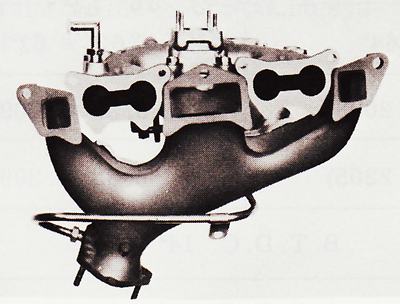
Variations consist of:
- Size of the EGR port (diameter of hole and thread size)
- Location. Early engine had it come straight out of the manifold outlet, while newer ones have it pointing almost up
Intake Manifold
Intake Manifold has a specially machined flat area where the EGR Body bolts. Nissan calls this adapter body the "EGR passage". In turn, the EGR Control Valve bolts to the body.
circa 1980 A14 JDM with VVT (or BPT)

1981-1982 H95 EGR (valve not installed)

Block Off
For off-road vehicles, or when using a newer manifold on a non-EGR engine, the EGR valve can be unbolted and a block-off plate put over the opening.
EGI
A14E and A15E EGI fuel injection engine manifolds use an EGR system.
Switches
These switches are to limit when the EGR works. Don't delete or bypass them otherwise your EGR will work full-time (not good).
Thermal Switch
This prevents EGR from working until the engine warms up. This switch is your friend.
2-Port Thermal Vacuum Valve
From 1975, a simple, reliable engine-coolant Vacuum switching valve is used by most implementations. It threads into the cylinder head and is warmed by the engine coolant. Nissan started calling this a TVV (Thermal Vacuum Valve) in the 1980s.
The switch has two ports. One hose comes from the carburetor signal, the other goes to the EGR valve.
The switch only opens when the coolant exceeds 134F (57C).
14890-U6700 THERMAL VACUUM VALVE
* B210 JPN A12.V,A14.V 1975-1977
* USA/CAN B210 1975-1977
* B120 A12S 7908-8910
* B310 JPN VAN
* B310 A14/A15+A14.KFU / A12.CAN 1278-
* C22 A15S 8605-
 * NPT 3/8" - 18 threads
* NPT 3/8" - 18 threads
14890-U7800
* C120 A14.K, A15
* B310 JPN A12S.S,K A14.V A13s, A15S, A15E

* 1982 Datsun 210

14890-H9910 <> 14890-H9911 > 14890-H7260
* USA B210 A14 1977 14890-H7260
* USA B310 A12.CAL 0879-0780

Thermal Electric Switch
For the first year 1974, instead of the simple thermal vacuum switch, an engine-coolant electric switch was used along with a relay and an electrically-operated vacuum switch. This was replaced in 1975 by the simpler thermo-vacuum switch. This electric switch came on at an early temperature of 88-106F (31-41C).
USA B210 A13 1974 22120-H6200 ASSY-SWITCH WATER TEMP 22110-N3600 ASSY-SWITCH WATER TEMP * (22110-N3600 shown in catalog, perhaps a typo) * 22120-N3601 used by 620 L18 1974 & S30 L26 1974
USA B310 22120-H9801 0880- A14/A15 22120-H9501 0880- A14/A1522120-H8900 0879- A12 CAL temp switch

35C switch
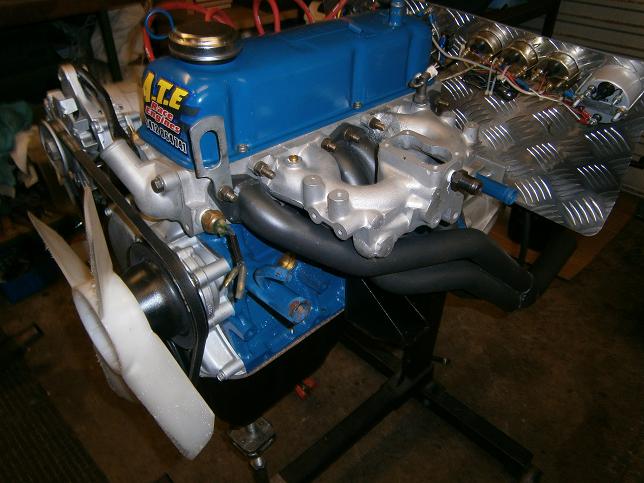
For 1980 and 1981, some models used an electric switch:
ENGINE COOLANT TEMPERATURE SWITCHUSA A15 N10 1981, fitted to EGR boss or to head * 22120-H9501 35C * 22120-H9560 35C * 22120-H9801 17C 22120-H8900 CAL * USA A14 N10 1980 * JAPAN B310 A14E EGI * EUROPE C120 A15S [fitted to cylinder head, front left]
3-port Thermal Vacuum Valve
This switch looks similar to the 2-port TVV, but the third port goes to the air cleaner. It bleeds off the carburetor vacuum signal, thus de-activating EGR. It is used in conjuction with a vacuum-delay valve in the hose that goes to EGR valve, which smooths out the reponse on quick throttle changes.
This switch is located on the rear of the cylinder head (firewall end), whereas the 2-port valve in on the front end.
This 3-port switch allowed Nissan to combine the EGR switch with the Spark Control (vacuum advance) switch, since both systems bleed to air.
- One port for EGR signal
- One port for Vacuum Advance (spark) signal
- One port for air bleed
By using a 3-port switch, it can bleed off both spark advance and EGR signals:
- When when the engine is cold, bleeds the EGR port, thus deactivating EGR
- When engine is in-between hot and cold, bleeds the distributor port
IMPORTANT The three ports act differently So connect the hoses correctly
- Top port: to air cleaner
- Middle port: To BPT
- Lowest port (closest to head): to distributor
14890-U9800/14890-U9810
* USA B310 0880- A14/A15 A12.FED A12.CAL
* One hose is larger than the other two

14890-H7700
* USA B210 (EXC FED GFU) 1978
* B310 USA A14/A15 USA -0780 / A12.FED 0879-0780
* 3 equal size hoses

Vacuum Switching Valve
Some MT (manual transmission) models de-activated EGR when in neutral or in top gear. This made use of the transmission Neutral switch and transmission Top switch to electrically operate a bleed switch.
1975 Manual Transmission FED & CAN 1978 Manual Transmission USA except FU Engine models
This is similar to the Transmission Controlled Spark (TCVAS) used on some Manual Transmission models, which cuts the spark advance when in certain gears. Only in this case it deactivates EGR.
VALVE ASSY-SOLENOID EGR CUT 14956-U6700 JPN B210 A14T <> 14956-U6701 14956-U6705 JPN B210 A14S.V < 14956-U6701 14956-H7206 JPN B310 except A14E * Also used by C120 and C22
USA B310 14956-H7206 A14,A15 USA 0880- / A12.CAN -0879 14956-U6705 A14.MT A15 -0780 / A12.CAN -1278
14956-U6705
* B210 USA CAL+FED.MT 0876- CAN.MT(1978)
https://i297.photobucket.com/albums/mm219/ddgonzal/Datsun%201200/wiki/sightings/forum
14956-H7200 <> 14955-H7200 <> 14956-H7201
* B210 CAN
Transducers
Transducer Valve gets a backpressure signal. One metal tube connects to the exhaust, and a vacuum line Tees into the EGR line. This allows the Transducer Valve to fine-tune the EGR signal.
BPT
Starting in 1977, a BackPressure Transducer (B.P.T.) Valve was added to USA models. The metal tube connects to a port on the EGR body, near where the main EGR metal tube came in.
Tube variations
- 1977: BPT tube threaded on both ends on two-piece tube. Joined by rubber hose in the middle.
- 1978 up: threaded on the manifold end, used a rubber hose on the Valve end
BPT was used with 2-port OR 3-port Thermal Switches

VVT
Venturi Vacuum Transducer replaced the BPT valve on 1981 models to fine tune how much Recirculation is used. Instead of the crude early systems without VVT, the 1980s implementations use the VVT valve as an amplifier for input signals from backpressure and carburetor signal.
If you run EGR, then VVT is your friend.
1200
79 October: EGR fitted to Datsun 1200
EXHAUST GAS RECIRCULATION VALVE 14710-H8500 7908-8109 14710-H9961 8110-8910
E Emissions
Japan Emissions#E 1978 regulations were applied to the B121 which arrived in 1979 October.
EXHAUST GAS RECIRCULATION VALVE 14710-H8500 7908-8109 [B121] EGR VALVE GASKET 14719-N3301
VALVE-THERMAL VACUUM 14890-U6700
L Emissions
Japan Emissions#L 1981 regulations were applied to the early B122 which arrived in 1981 October.
same as B121, except:
1. EGR Valve changed to 14710-H9961 8110-8910 [B122] 2. #VVT added 17450-G2600 TUBE ASSY-VVT CONTROL 8110-8910 14755-W5800 TUBE-PASSAGE TO BTP 8110-8910 14771-01M01 VALVE ASSY-VVT 8110-8910
R Emissions
Japan Emissions#R 1988 regulations were applied to the late B122 which arrived in 1989 October.
No EGR?
History
1974: EGR fitted to North American B210.
Australia
Starting with 1982 model 1200 utes were fitted with EGR.
Japan
1975 EGR fitted to Japan B210 (NAPS-A) 1980 B310 EGI engines used EGR 7910 #EGR fitted to Datsun 1200 1981 October: VVT added to Datsun 1200
North America
Keep in mind that intake & exhaust manifolds changed almost every year, for reasons not usually related to EGR. Also the EGR valve specification changed every few years, and differed by Transmission. Bolt pattern remained the same.
1974: EGR first fitted to North American B210. This was the A13 engine.
- It used a basic system, except the switch was a complicated electric system.
1975: EGR continued on the new A14.
- Simpler 2-port Thermal Vacuum Switch replaced 1974's electric switch, relay, solenoid and wiring.
- On-temperature activation point was raised.
- (FED + CAN) Manual transmission cars added Vacuum Switching Valve which enable EGR de-activation when in neutral or top gear. CAL cars did not use this, nor did AT cars.
- FED cars used a separate EGR warning system that did not interact with the EGR system. It simply notified the driver via dash light at 50,000 miles.
1976: 1975 system carried
- B210 adopts same Thermal Vacuum Switch as Datsun 610 and Datsun 710 (minor change)
- EGR tube shape changed
1977: For USA, EGR flow increased to reduce NOx
- EGR warning system discontinued
- Canada unchanged. CAL + FED is changed
FED + CAL NOx emissions tightened
NOx emissions 1976 all: 3.1 1977 CAN: 3.1 1977 FED: 2.0 1977 CAL: 1.5
- Exhaust Manifold has larger EGR port, otherwise is same as 1976.
- Larger EGR Tube to manifold
- BPT valve added
USA Exhaust Manifold EGR Tube inner diameter 11.8mm (8mm 1976) Manifold boss dia.: 32mm (25mm 1976) Thread size: M22 (M16 1976)
1978:
- CAN adopts large EGR tube (and Exhaust manifold), even though NOx requirements did not change
- CAN retains basic EGR
- BPT Tube (USA models) simplifed one-piece design
- FU models retain 2-port thermal valve
- USA non-FU changed to 3-port thermal valve
1979: no changes from 1978
- CAN models: Basic EGR
- FU Engine models: Basic EGR + BPT Valve
- USA except FT: BTP Valve + 3-port TVV
1980
- Switched back to 2-port thermal valve
1981
- USA NOx emissions further restricted
NOx emissions - Passenger Car 1977-1980 FED: 2.0 1981 FED: 1.0 --- 1980 CAL: 1.0 1981 CAL: 0.7
- USA replaced BPT with VVT
- FED EGR secondary air passage increased from 11mm to 18m
- FED EGR Tube mounting screw increased from M20 to M22
- USA uses VVT and 3-port TVV
- CAN MPG (A14 FU engine) adds VVT and 3-port TVV, all other CAN models remain basic
1982: No changes

![[Datsun 1200 encyclopedia]](/wiki/upload/wiki.png)

